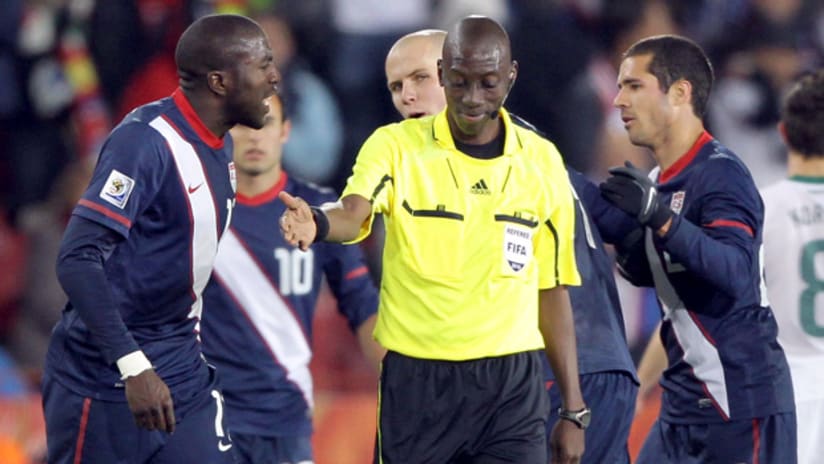Landon Donovan was practically up in arms in the postgame press conference. U.S. Soccer Federation president Sunil Gulati swore he saw no foul, and had texts from 43 friends to prove it.
Bob Bradley thought, if anything, three fouls could have been called on Slovenia on the controversial ending to Friday’s match.
Practically the entire US squad thought Maurice Edu’s goal in the 85th minute was the capper on an incredible comeback, and that they had been robbed one of the more sensational results in recent US history.
Ironic that the hotheaded Michael Bradley—the epitome of raw, unchecked emotion on the US squad—was the only voice of reason.
“I have no comment on that play,” he said after the US’ 2-2 draw with Slovenia. “There’s no point talking about it.”
He’s never been more correct. When the US look back at this game, they shouldn’t see a victory robbed from them by head official Koman Coulibaly. They should see a game in which they failed to grab the opportunity, took a ready opponent too lightly and were, once again, forced to chase.
After battling back with two goals in the second half, the US bagged what looked like a go-ahead goal when Donovan’s free kick found Edu, who volleyed it past Samir Handanovic for an emphatic finish. But Coulibaly waved the goal off for a reason that still isn’t clear.
“I don’t really know what the call was,” Edu said after the match. “I didn’t see anything wrong. It’s what I thought was a goal.”
The Americans surrounded Coulibaly, pleading for an explanation of why the goal was disallowed. But according to Donovan, he ignored them.
“We asked him numerous times in a non-confrontational manner, just asking what did he call,” Donovan said of the Malian official, “and he just ignored us or he didn’t understand.”
As Michael Bradley succinctly put it, it doesn’t matter one bit. It’s a mantra I repeat again and again: If one play is so crucial that your hopes of success hang in the balance, you shouldn’t have put yourself in a position where one play matters so much in the first place.
And that applies in big way to the US’ performance on Friday night. From the opening whistle, it was clear the Slovenians came to play, and the Americans were ill-prepared.
The José Francisco Torres experiment in the midfield was a disaster as it quickly became apparent Slovenia had too much size for the diminutive Texan.
Milivoje Novakovic, the tall, yet extremely mobile, creative striker of whom Bob Bradley had warned his team for the last six months, was as much of a threat as advertised, and the US couldn’t stop him in the first half.
And most worryingly, the back line collapsed in key moments, and Slovenia were more than happy to take full advantage with two goals before halftime.
“They played hard in the first 45 minutes,” explained a crestfallen Oguchi Onyewu. “They had their chances. I don’t think we created enough in first half.”
But for as poorly as the US played in the first half, their fierce rally in the second was characteristic of the team we’ve come to know when their backs are against the wall. They played with urgency and knew what they had to do to make it a game.
We saw the usual Kobe Bryant-like desire from Donovan, who buried the Americans’ first goal with a gorgeous bullet from the byline in the 48th, then the fire from Bradley, who worked his tail off to bag the equalizer in the 82nd.
That’s the team that needs to show up for 90 minutes—not the one that looked almost dazed in the first half. And somehow, the US need to learn that it takes 90 minutes to win a soccer game.
“It’s not like we sit there before the game and say to ourselves, alright, let’s wait until we go down 2-0 before we start playing the game,” Bradley said. “It’s something we’re not happy about.”
If the US are to advance out of the group stage from the hole they’re in, they need to take a good, long look in the mirror and understand that one play doesn’t matter. Their attitudes do, and they should devote their energy to playing a full 90 minutes.
Goalkeeper Tim Howard put it best:
“I struggle to find a reason to be hard done by, and a lot of the guys do,” he said. “I’m happy go into this [next] match against Algeria feeling like we need to win—and we will win.”


